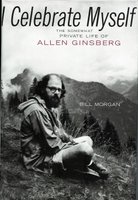Thursday, September 14, 2006
You can call me Al
 Speaking of Dylan (see my previous post), I just got a copy of I Celebrate Myself: The Somewhat Private Life of Allen Ginsberg, which details the poet's early infatuation with the Bard of Hibbing and his ambiguous role as mascot during the heyday of the Rolling Thunder Review. That aside, Bill Morgan's book is something of an oddity--surely the first biography to be transcribed directly from the subject's Filofax. I exaggerate, but only a little. Starting in the late Seventies, Morgan functioned as Ginsberg's archivist, organizing a vast chaos of papers, clippings, and photographs. It's no surprise that he would mine these materials, including the poet's journals, for his bio. Yet there's something doggedly external, even mechanical, about the finished product. Morgan tells us what Ginsberg did, year in and year out. We get a vivid sense of the quotidian--which, to be fair, is probably what the author had in mind--but very little discrimination between the momentous and the trival, as if all facts were created equal.
Speaking of Dylan (see my previous post), I just got a copy of I Celebrate Myself: The Somewhat Private Life of Allen Ginsberg, which details the poet's early infatuation with the Bard of Hibbing and his ambiguous role as mascot during the heyday of the Rolling Thunder Review. That aside, Bill Morgan's book is something of an oddity--surely the first biography to be transcribed directly from the subject's Filofax. I exaggerate, but only a little. Starting in the late Seventies, Morgan functioned as Ginsberg's archivist, organizing a vast chaos of papers, clippings, and photographs. It's no surprise that he would mine these materials, including the poet's journals, for his bio. Yet there's something doggedly external, even mechanical, about the finished product. Morgan tells us what Ginsberg did, year in and year out. We get a vivid sense of the quotidian--which, to be fair, is probably what the author had in mind--but very little discrimination between the momentous and the trival, as if all facts were created equal.One thing that does emerge from Morgan's book is Ginsberg's strange mixture of grandiosity and Zen-flavored self-effacement. Only days prior to his death, this prophetic personality was still hitting up the White House for the artistic equivalent of the Good Conduct Medal (no doubt he was the last person to treat Bill Clinton as a father figure). The anecdote is so representative that Morgan tells it twice, but here's the more detailed version:
One afternoon before he left the hospital he drafted a letter to President Clinton and asked Hale to type it. The short letter told the president, "I have untreatable liver cancer and have 2-5 months to live. If you have some sort of award or medal for service in art or poetry, please send one along unless it's politically inadvisable or inexpedient. I don't want to bait the right wing for you. Maybe Gingrich might or might not mind. But don't take chances please, you've enough on hand." After a lifetime of enjoying such great success and worldwide fame in writing poetry it was bittersweet that Allen felt he needed a final pat on the back from someone like the president. That night in the hospital bathroom, Allen looked in the mirror and said out loud, "Stop scheming, Ginsberg," thinking of that letter. However, when the draft was typed the next day, he signed it and had it mailed to the White House anyway. His own line, "Don't follow my path to extinction," had never been more appropriate.Sad, fascinating, funny. The passage gives a good sample of Morgan's style, which might charitably be called Buddhist meat-and-potatoes, and an atypical (i.e., judgmental) closing sentence. Incidentally, no reply came from the White House. Ginsberg died at home, at 2:30 in the morning, on April 5, 1997. His last recorded words appear to have been: "Gee, I never did that before."
In a thoughtful piece in the new Bookforum, John Palattella discusses the Morgan bio and the fiftieth-anniversary valentines (there were quite a few) addressed to Howl. He too finds I Celebrate Myself a little too mild-mannered in tone, especially when it comes to the more iffy episodes in Ginsberg's life. (Example: the ease with which the poet forgave his guru, Chögyam Trungpa, after the thin-skinned master had W.H. Merwin and his girlfriend stripped and paraded around his Halloween party. Click here for an excellent summary of the so-called Naropa Affair.) Palattella also addresses the diminishing quality of the poetry itself, and chalks up this decline to the gradual encroachment of Ginsberg's persona--the wild and whacky shaman--upon his art.
Perhaps the central mystery of Ginsberg's career is why he published so much work he knew wasn't up to snuff. Morgan says that Ginsberg thought many of the poems in Planet News, 1961–1967, which appeared in 1968, were drivel but that he chose to include them in the book nevertheless. Ginsberg admired the poetry of Basil Bunting, especially Briggflatts, but he didn't share Bunting's affection for the wastepaper basket or the blue pencil. ("Howl," which was heavily revised, is an exception.) Was Ginsberg's work blighted by the poet gradually becoming a prisoner of what Morgan calls "the business of being Allen Ginsberg," with the constant travel from one reading or meeting or protest to another making his desk into another foreign destination? Whatever the answer, the sad truth is that Ginsberg, through his failure to create a body of work that wasn't merely derivative of his greatest hits--which are truly great--did end up sharing the fate of many a rock star.Finally: if you can't beat 'em, join 'em. Here's a late collaboration between Ginsberg and an actual rock star, Sir Paul McCartney. The freaky imagery and Sixties footage come courtesy of director Gus Van Sant, and the poet, wearing a stovepipe hat in the opening shots, looks like he's playing Abe Lincoln in a school pageant. Not the greatest poetry, but hey, that's entertainment.
